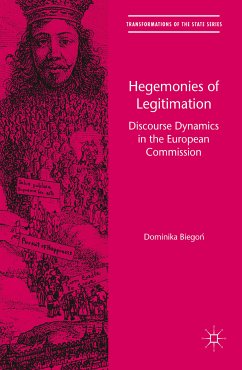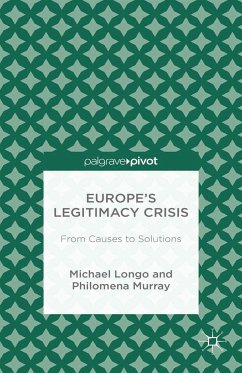
Hegemonies of Legitimation (eBook, PDF)
Discourse Dynamics in the European Commission
Versandkostenfrei!
Sofort per Download lieferbar
72,95 €
inkl. MwSt.
Weitere Ausgaben:

PAYBACK Punkte
36 °P sammeln!
The legitimacy of the European Union is a much studied and highly contested subject. Unlike other works, this book does not engage in another review of the shifts of public opinion and perception regarding the EU. Instead, it offers a different and innovative perspective by focusing on constructions of legitimacy in the European Commission. Starting from the premise that legitimacy is discursively constructed, the book engages in a fine-grained analysis of legitimacy discourses in the European Commission since the early 1970s. Embedded in a poststructuralist theoretical framework, Hegemonies o...
The legitimacy of the European Union is a much studied and highly contested subject. Unlike other works, this book does not engage in another review of the shifts of public opinion and perception regarding the EU. Instead, it offers a different and innovative perspective by focusing on constructions of legitimacy in the European Commission. Starting from the premise that legitimacy is discursively constructed, the book engages in a fine-grained analysis of legitimacy discourses in the European Commission since the early 1970s. Embedded in a poststructuralist theoretical framework, Hegemonies of Legitimation also sheds light on the conditions that made radical shifts of legitimacy discourses possible, and illustrates how these discursive shifts paved the way for different types of legitimation policies. As such, the book maps and reconstructs the historically variable discursive landscape of competing articulations of what legitimacy signifies in the case of the EC/EU, and provides us with a detailed picture of the history of the Commission's struggle for legitimacy.
Dieser Download kann aus rechtlichen Gründen nur mit Rechnungsadresse in A, B, BG, CY, CZ, D, DK, EW, E, FIN, F, GR, HR, H, IRL, I, LT, L, LR, M, NL, PL, P, R, S, SLO, SK ausgeliefert werden.












